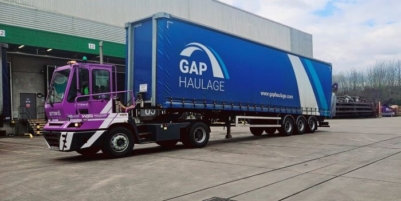-
Nutrivend selects Forterro’s Orderwise to support online expansion and streamline operations - April 11, 2025
-
ARROWXL LAUNCHES AMBITIOUS ZERO WASTE ROADMAP - April 8, 2025
-
THE BCMPA’S NEW CAMPAIGN DRIVES OUTSOURCING SUCCESS IN Q1 - April 7, 2025
-
BLACKOUT TECHNOLOGIES TARGETS TELEMATICS-INTEGRATED MOBILE DEVICE BLOCKING TO COMBAT SMARTPHONE DISTRACTION - April 1, 2025
-
Sparck Technologies awarded Royal designation - March 27, 2025
-
OpenADR Alliance announces first OpenADR 3.0 certified products with EVoke Systems, E.ON Energy and Universal Devices - March 25, 2025
-
Growing fulfilment and contract packer appoints new Managing Director - March 25, 2025
-
When is it time to invest in a WMS? Understanding the key trigger points - March 25, 2025
-
eCapital helps Vantage Recruitment on its journey to financial success - March 24, 2025
-
Hugo Beck Celebrates 70 Years of Packaging Innovation with Open House Events - March 20, 2025
Almost half of UK transport and distribution staff still can’t afford basic living expenses, despite many working more hours than ever in 2023
- Poll finds that one in eight workers are relying on food banks for help
- Overtime and pay rises made little difference to frontline employees’ finances, with 40% clocking up more hours in 2023 than previous years
With planned industrial action already hitting headlines in the first weeks of 2024, a new study has found that around half of UK frontline or deskless staff working in transport and distribution are still struggling to cover their basic living costs – despite many working longer hours than ever in 2023, to keep up with rising expenses.
The pan-European poll by workforce management experts Quinyx looked at the working patterns of frontline staff across several industries, including transport, warehousing and distribution. It found that 40% of UK employees in these sectors clocked up more hours in 2023 than in previous years, saying they needed the extra income to support their families.
Despite more than a third (35%) of staff receiving a pay rise in 2023, they didn’t feel better off as a result. Nearly half (48%) said their wages barely cover living costs – more than workers in similar roles in the Nordic countries (31%), The Netherlands (37%) and Germany (39%).
One in eight (13%) frontline staff said they’d had to use food banks, while around a fifth (22%) had to accept financial support from friends and family to help with basic expenses.
Toma Pagojute, chief HR officer at Quinyx, says: “As recent news of planned industrial action demonstrates, workers within logistics-based sectors such as transportation and distribution really struggled last year, and want a brighter, less stressful 2024. While many employees received pay rises, it seems they didn’t always have much of an impact, and workers had to put in more hours than ever. When the resulting pay still doesn’t cover basic living costs, it can be demoralising to say the least.
“Many organisations are facing their own challenges, of course, but we would love to see more of them placing renewed focus on their workforce’s engagement and overall wellbeing in 2024 – not just by looking at pay but on the overall experience of their staff.
“While there are signs of an improved economic outlook for 2024, changes won’t be felt overnight and there is more that bosses can do to prevent employees from feeling stressed, overworked and overwhelmed – this might be by offering flexible work schedules, improving communications, utilising more tech solutions, and ensuring working conditions are the best they can be.”
































